Admiral Vasily Yakovlevich Chichagov. The main battle of the naval commander
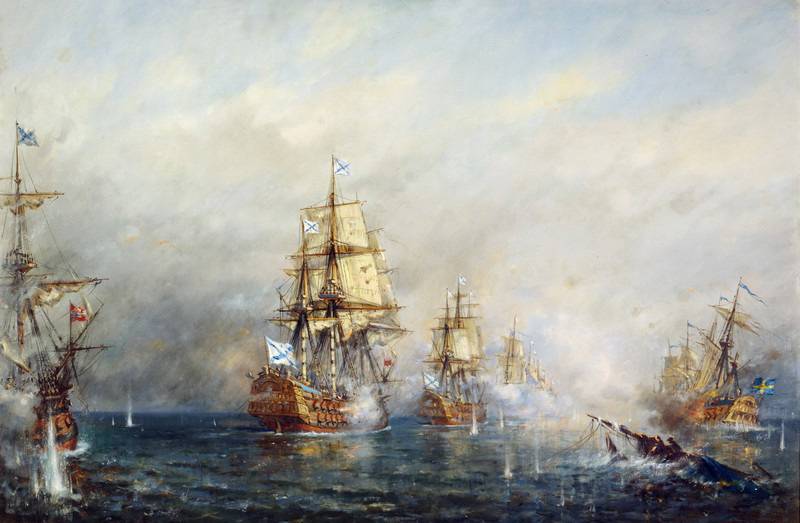
Few doubted the next war with the Turks. Relations between the two empires remained more than tense and rapidly deteriorated. The accession to Russia of the Crimean Peninsula in 1783 was extremely painful and hostile in Istanbul. Being supported by the party of revenge, on the one hand, and politely nodding ambassadors of some Western partners, on the other hand, the sultan was becoming more and more sharp in his statements.
In the north, the situation was also far from calm. Ten years ago, in August of 1772, under the vents of guns and with generous foreign funding, King Gustav III decided to significantly simplify the system of public infrastructure in Sweden. The powers of the Riksdag were significantly curtailed - it was relegated to a deliberative body convened by order of the monarch. The king who adored the theater was obviously tired of playing surrounded by extras, and he decided to continue his performance in the form of a solo monologue.
The trouble for Sweden lay in the fact that its next ruler, in addition to his passion for high arts, had a passion for military glory. The Swedes began full-scale preparations for the war, and the louder the clanging weapons Ottoman Porta, the Swedish axes knocked more energetically, turning old oak groves and pine forests into battleships and frigates.
In the autumn of 1787, the expected Russian-Turkish war began. As before, the Baltic began to prepare for the march a squadron for combat operations in the Archipelago, actually in the rear of the Turks. However, unlike the previous war, on the Black Sea, Russia had at least small, but already full-fledged naval forces, and not just the Azov flotilla with its flat-bottomed ships. The command of the new Archipelago squadron was entrusted to Samuel Karlovich Greig.
Information about the weapons and equipment of Russian warships in Kronstadt and Reval, the Swedes used in their information preparation for war. Across the Baltics, rumors were spread that, they say, the Russians were preparing their fleet in order to suddenly attack the very peaceful northern neighbor. Under this noise in Sweden began mobilization of the fleet and the deployment of the army. All attempts by Russian diplomacy to emphasize their peacefulness and to persuade their neighbors not to worry about success did not lead.
The impressive financial assistance from France and Turkey only strengthened Gustav III’s belligerent ambitions. In June 1788, the Swedish king put forward an ultimatum to Russia: to give back the territories in Finland that became part of Russia after the signing of the 1721 and 1743 peace treaties, and all of Karelia. In addition, Gustav demanded to punish the Russian ambassador in Stockholm, Count Andrei Kirillovich Razumovsky, because he sows discord and weaves intrigue. The real gem of this radiant, uncomplicated stupidity of the composition was the demand to return the Crimea to the Ottoman Empire. After reading this document, the Prussian ambassador to Russia, Count Keller, expressed serious concerns about the health of the Swedish king, especially his mental component. So began the last of the three in the XVIII century Russian-Swedish war.
The Baltic is on fire again
The plan of the Swedish command was simple and aggressive. Initially, the Russian fleet had to impose a battle in the Gulf of Finland and, after its undoubted triumphant result, attack and burn Kronstadt. At the same time, the rowing fleet would carry out a landing operation in order to capture Helsingfors. Confidence in success was based not only on the desire of Gustav III to stand in stories on a par with their famous ancestors, but also the excellent condition of the Swedish fleet. Fully operational, equipped and equipped with trained crews, he had 26 battleships and 14 frigates at the start of the war.
On paper, the Russian fleet had 46 battleships and 15 frigates. However, not all of them were in combat readiness. So by the number of ships, the forces of the parties were generally comparable. The specific plan of the war with the Swedes was also absent, despite the steady cooling of the Russian-Swedish relations, beginning in the middle of the 1770s. Perhaps in St. Petersburg they hoped for glimpses of common sense in the King-theater-goer. But Gustav craved a benefit performance - and certainly in the Winter Palace. When the war began, it was decided to bring the fleet into the sea, find the enemy and defeat him decisively.
After receiving a report on the start of hostilities, the Russian fleet was ordered to prepare to leave Kronstadt. Catherine the Great was led by Admiral Samuel Karlovich Greig, who until then had been the commander of the Mediterranean expedition that had not taken place. Of course, Greig could not immediately complete the task - not all the ships were ready, and the crew - are completed. 28 Jun. Greig finally put his fleet into the sea, having at its disposal 17 battleships and 7 frigates.
And what about Chichagov? Since the beginning of the war, the main post of commander of the active fleet was bypassed by the admiral - the empress appointed Greig. Vasily Yakovlevich considered himself offended due to the fact that he was preferred to a foreigner, and said sick. Chichagov believed that he was obliged by his unappointment to a large and rather brisk "foreign party", interpreted near the Russian throne. The fact that it was not he, but Greig, who led the fleet in the new war, nevertheless did not cause hostility between two distinguished admirals. Chichagov highly appreciated the victory gained by Greig at Goglandwhich actually thwarted the Swedish war plan in 1788. The enemy fleet hastened to take refuge behind the strong forts of Sveaborg, Greig, in turn, took this port to complete blockade. However, during the blocking of the port, Samuel Karlovich became seriously ill and 15 of October 1788 of the year died in Revel, where he was rushed to the flagship ship Rostislav.
Rear Admiral Timofey Gavrilovich Kozlyaninov, who assumed command of the fleet, soon turned the blockade of Sveaborg and set off for the wintering in the harbors of Kronstadt and Revel. Taking advantage of this opportunity, the Swedish fleet was able to go to Karlskrona, slipping out of the trap.
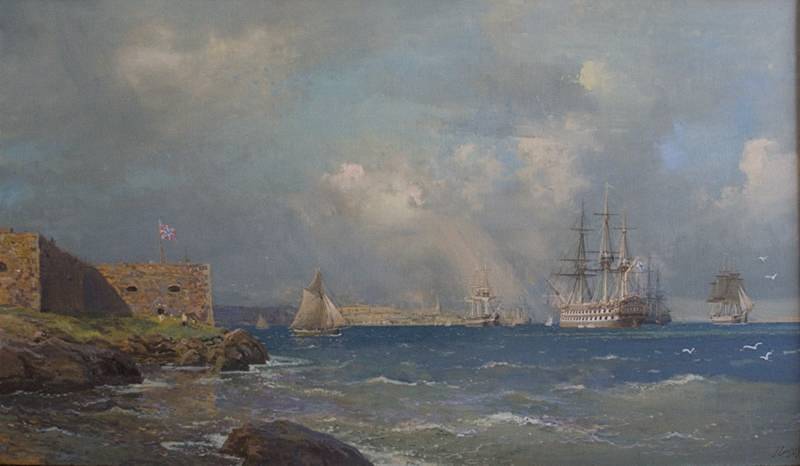
The 1789 campaign of the year was not very easy under current conditions. It was necessary to unite the Kronstadt, Revel squadrons and a detachment of ships under the command of Vice Admiral Vilim Petrovich Fondezin, who was stationed in Copenhagen, before the enemy, surpassing each of these compounds separately, would go into the sea and attack. Of all the possible candidates, Empress Catherine the Great unequivocally chose Vasily Yakovlevich Chichagov.
At the head of the fleet
The admiral arrived in Revel to take part in the funeral of Samuel Karlovich Greig. Soon Chichagov received the Rescript from 27 in November 1788, according to which he was appointed to command the Revel squadron and the port itself. Of course, all the "disease" Vasily Yakovlevich as hand removed.
The admiral entrusted to him was found in a very neglected state. The port of Revel for a long time was used mostly for commercial purposes, mainly for the export of grain, and as such was little suitable for the base of a large squadron. I had to deal with the restoration and reconstruction of port facilities, water supply was built. There was no suitable building for the hospital equipment in the city, and the empress handed over the newly renovated palace for this purpose.
Chichagov did a lot to increase the combat readiness of the squadron entrusted to him in the conditions of the constant lack of necessary resources and materials. In the spring of 1789, Mr. Vasily Yakovlevich was summoned to St. Petersburg, where he was notified of Ekaterina’s decree on the appointment of his commander of the fleet. Chichagov's command now was not only the Revel, but also the Kronstadt squadron, as well as a detachment of Russian ships in Copenhagen.
Preparation for the upcoming campaign was in full swing. In May, the Kronstadt squadron, commanded by Rear Admiral Alexei Grigorievich Spiridov, the son of the hero of Chesma, arrived in Revel 1789. July 2 Russian fleet out to sea. Chichagov had at his disposal 19 battleships, 5 frigates, 2 bombing ships and several hospital and transport ships.
A meeting with the enemy, who, according to intelligence data, had already left Karlskrona, took place on July 14 near the island of Öland. The Swedish fleet under the command of the Duke of Södermanland included the 21 battleship and the 8 frigates, two of which were large double-deck ones. By the amount of artillery, the Russian side had parity with the enemy.
The next day, on July 15, the two opposing fleets lined up in the wake columns and, following parallel to each other, began a shootout that lasted more than 6 hours. At nightfall, the battle subsided by itself, in the morning the Swedish fleet, not wanting to continue, went to Karlskrona. Losses in the ships did not suffer, only a few were slightly damaged. Despite the uncertain tactical results, the strategic success was for the Russian side. As the Swedes left, Chichagov freely met a detachment of ships from Copenhagen, which significantly increased his available forces. Not meeting the enemy anymore, in August the Russian combined squadron arrived at the Revel raid.
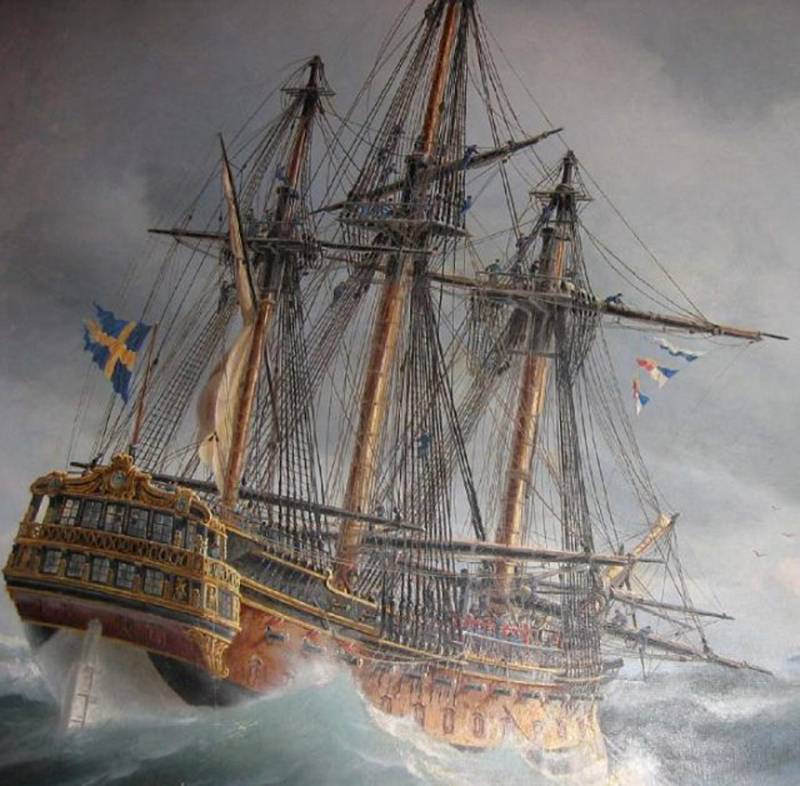
Admiral Chichagov's actions Eland battle aroused keen discontent of Catherine II. The Empress ordered the Military Council to deal with this matter. In her letter, she pointed out, "that the Swedes attacked him, and not he them." The fight was reduced to a lazy and ineffective skirmish, as a result of which "the captain of the brigadier rank and several hundred other soldiers were lost without any benefit from the Empire." By the way, the battleship "Fight", which suffered the greatest losses among Chichagov's squadron (15 killed and about 30 injured), suffered not at all from the Swedish cores, but from three of their own exploded cannons.
Despite the sovereign's wrath, which seemed fair to some historians, the Military Council, having studied the details of the Battle of Eland, issued an acquittal verdict, indicating that in this situation Chichagov acted within the framework of the instructions given to him. Indeed, the admiral met the Copenhagen detachment unimpeded and escorted him to Kronstadt, having beaten off the attack, however, sluggish, of the Swedish fleet. Chichagov remained in his position and, as it turned out later, for good reason.
Decisive battles
In the 1790 campaign of the year, the theater king has not lost his desire to play his benefit performance in St. Petersburg. Some circumstances contributed to this. The Swedish fleet at the expense of quite generous English subsidies replenished with new ships. Under the pressure of England and partly of Prussia, the allied Russia of Denmark "expressed regret" and withdrew from the said union. Gustav III knew that Russia was fighting on two fronts, and did not lose faith in victory. Catherine II also did not doubt in her success - she was simply annoyed by the slowness of achieving this success, especially since reports about regular victories came regularly from the southern theater of operations.
Russia needed a decisive breakthrough in the war with Sweden. Chichagov and the fleet under his command were required to securely cover the waters of the Gulf of Finland, while the Russian navy fleet would cut off the water lines used by the Swedish army in Finland, and later awakened from hibernation, Count Musin-Pushkin, commander of the land army, would show some similarity decisive action.
Vasily Yakovlevich had a difficult year for 1789: the empress's discontent, however, later neutralized, then his son Gregory, who was his adjutant, died on November 17. In the campaign 1790, his place was taken by the next son of Chichagov - Vasily, transferred from the guard. In addition, another Chichagov Jr., Pavel, commanded the flagship battleship in the father’s fleet.
Swedes from the beginning of the campaign began to show activity. Released from Karlskrona, the enemy fleet consisting of 22 battleships, 4 frigates and several smaller 2 ships in May 1790, appeared in view of the Revel raid. The squadron under the command of Chichagov, which was anchored in anticipation of reinforcements from Kronstadt, consisted of 9 battleships, 5 frigates and 2 bombarding ships. Despite the tangible superiority in forces, Karl Södermanlandsky could not achieve at least some success - Chichagov successfully repulsed all attacks by twice the superior enemy.
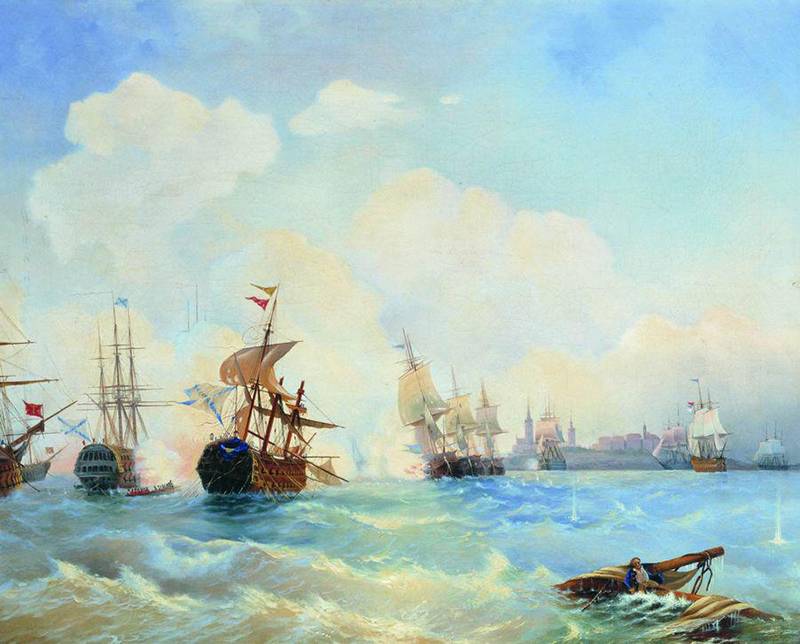
An attempt to try the Revel walnut on the fortress cost the Swedish fleet two “broken teeth”. One battleship, the Prince Carl, was damaged and surrendered. The second, Raxen Stender, sat on the reef and was burned by his own team. Several other ships were damaged. Chichagov's victory was complete - for the Battle of Revel, he was awarded the Order of St. Andrew the First Called.
Next time Vasily Yakovlevich met with the enemy of 22 on June 1790 of the year in Vyborg Bay. Under his command, both the Revel and Kronstadt squadrons already included 27 battleships, 5 frigates, 8 rowing frigates and a number of smaller ships. The operation also involved the Russian rowing fleet under the command of Prince Nassau-Siegen. The Swedish fleet consisted of 22 battleships, 10 frigates and about 200 rowing ships and ships of the skerry fleet.
As a result of the breakthrough of the enemy fleet from the Vyborg Bay fierce battleThe result of which was again the complete victory of the Russian side. King Gustav III lost the day to 7 battleships, 3 frigates and 54 rowing and auxiliary ships. The loss of personnel reached about 2 thousand prisoners and several thousand dead. The damage to the Russian side was estimated at hundreds killed and two hundred wounded. Because of the traditionally cautious, carefully calculated and unhurried manner of leading the battles characteristic of Chichagov, the Swedish fleet still managed to escape in Sveaborg and Rochensalm. The naval commander did not realize the possibility of completely destroying the enemy naval forces and winning the war with one blow. Nevertheless, for this victory, the admiral was the first of the sailors who was awarded the Order of St. George, First Class.
Last years
The war with Sweden died down - the head of King Gustav III, hot from harmful dreams, was finally cooled by the Vereli world. Admiral Chichagov actually commanded the Baltic Fleet over 1791 – 1795. The international situation was extremely difficult - the start of the revolutionary wars in France, the uprising in Poland demanded to maintain the fleet’s constant combat readiness. Admiral Chichagov constantly displayed his ships at sea, studying and training.
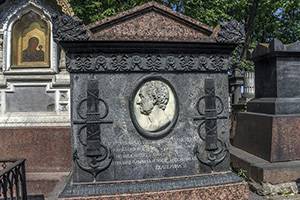
Starting from 1794, Vasily Yakovlevich worked in a special commission that approved the states of the Black Sea Fleet. With Paul I, who took the throne in November 1796, and the old seaman, the relationship did not work out - in 1797, he voluntarily retired. According to his son Pavel, the admiral left the fleet because of the reluctance to obey the instructions of the imperial favorite G. G. Kushelev on sea maneuvers in July 1797 - Grigory Grigorievich once served as Chichagov's midshipman.
The last years of his life a sailor, polar explorer and naval commander lived in his estate. Under Pavel I, Chichagov was actually in disgrace - he was not allowed to come to Petersburg even for a meeting with his son. 4 died on April 1809 of the year and was buried at the Lazarevsky cemetery of the Alexander Nevsky Monastery. The lines written by Catherine II after the Battle of Revel were stamped on his monument: “The Swedes went to him with triple strength. Upon learning, he rivers: God is my protector. They will not swallow us. Reflecting, captivated and won the victory. "
Information